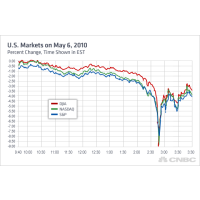Providence Sues Stock Exchanges over High-Speed Trading
 Flash Crash May 6, 2010 (graphic: CNBC)
Flash Crash May 6, 2010 (graphic: CNBC)
A Who’s-Who of Wall Street players and exchanges are being sued by the city of Providence, Rhode Island, for allowing high-speed traders to get an unfair advantage over other investors.
The class action lawsuit filed by the city targets the New York and Chicago stock exchanges, NASDAQ and many of the most powerful banks and investment firms in the country: Goldman Sachs, JPMorgan Chase, Bank of America, Morgan Stanley, Citigroup, Credit Suisse, and Charles Schwab, among others.
These defendants allegedly utilized “devices, contrivances, manipulations and artifices to defraud” and manipulate “the U.S. securities markets and the trading of equities on those markets,” the complaint states.
The alleged fraud involving sophisticated high-frequency trading (HFT) firms resulted in the diversion of “billions of dollars annually from buyers and sellers of securities to themselves,” according to the lawsuit.
The suit charges that the defendants’ conduct included:
- “Electronic front-running” - where, in exchange for kickback payments, the HFT Defendants are provided early notice of investors’ intentions to transact by being shown initial bids and offers placed on exchanges and other trading venues by their brokers, and then race those bona fide securities investors to the other securities exchanges, transact in the desired securities at better prices, and then go back and transact with the unwitting initial investors to the their financial detriment;
- “Rebate arbitrage” - where the HFT and Brokerage Firm Defendants obtain kickback payments from the securities exchanges without providing the liquidity that the kickback scheme was purportedly designed to entice;
- “Slow-market (or latency) arbitrage” - where the HFT Defendants are shown changes in the price of a stock on one exchange, and pick off orders sitting on other exchanges, before those exchanges are able to react and replace their own bid/offer quotes accordingly, which practices are repeated to generate billions of dollars more a year in illicit profits than front-running and rebate arbitrage combined;
- “Spoofing” - where the HFT Defendants send out orders with corresponding cancellations, often at the opening or closing of the stock market, in order to manipulate the market price of a security and/or induce a particular market reaction;
- “Layering” - where the HFT Defendants send out waves of false orders intended to give the impression that the market for shares of a particular security at that moment is deep in order to take advantage of the market’s reaction to the layering of orders; and
- “Contemporaneous trading” - whereby obtaining material, non-public information concerning the trading intentions of Plaintiff and the Plaintiff Class and then transacting against them, Defendants violate the federal securities laws, including §20A of the Exchange Act.
The civil case comes in the wake of the book Flash Boys: A Wall Street Revolt by Michael Lewis, which claims stock markets have become manipulations of high-frequency traders.
-Steve Straehley, Noel Brinkerhoff
To Learn More:
City Sues NYSE, Claiming Market Is Rigged (by Dan McCue, Courthouse News Service)
Exchanges, Brokerages Hit with High-Speed Trading Class Action (by Nate Raymond, Reuters)
City of Providence v. BATS Global Markets (U.S. District Court, Southern New York)
Wall Street Hides from Regulators in “Dark Pools” (by Noel Brinkerhoff, AllGov)
Other Nations Begin to Regulate Stock Market High-Speed Trading, but not U.S. (by Noel Brinkerhoff and David Wallechinsky, AllGov)
- Top Stories
- Unusual News
- Where is the Money Going?
- Controversies
- U.S. and the World
- Appointments and Resignations
- Latest News
- Musk and Trump Fire Members of Congress
- Trump Calls for Violent Street Demonstrations Against Himself
- Trump Changes Name of Republican Party
- The 2024 Election By the Numbers
- Bashar al-Assad—The Fall of a Rabid AntiSemite






Comments